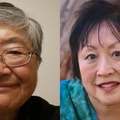My parents named me Gorobei Yoshida. It is an old fashioned name. My mother said I was named after her grandfather, who was a respected man in our village back in Japan, but my uncle says, that was the name of my mother’s favorite movie star as a teen. Most of my friends call me Goro, at least, the ones who can pronounce my name properly. My father’s Mexican helpers have nicknamed me Gordo. My father is a gardener.
My father moved the family here from Kumamoto prefecture, Japan, when I was 12 years old. As he spoke little English, he took up gardening as his profession. During the summer I worked with my father and on Saturday too. When father’s helpers called me Gordo, it sounded like “Goro,” so I didn’t bother to correct them. It was better than “Go Row”—the name I was tagged with at school.
Anyway, I got used to hearing Gordo from my father as well as his helpers. Eventually, my family started calling me Gordo too. But none of us had any idea that it had a special meaning in Spanish. It wasn’t until my classmates heard my sister, Miki call me “Gordo” that they all began to laugh and make fun of me.
“Hey fatso, fatty, chubby,” a few kids taunted me.
I caught the look on Miki’s face. She was shocked and distressed that she caused this embarrassment.
My friend Juanita caught my arm. “Don’t listen to them. You’re not fat or even pudgy, so it is a label of endearment by the person who gave you the nickname.”
“Thanks Juanita,” I patted her hand. By not reacting to the taunts, I saw that the name calling seemed to subside, which was a relief as my parents reminded me regularly, don’t make waves, don’t get into trouble, no fighting, as I was quick to anger.
Things were going well at school. I didn’t have any problems with my classmates except for Rickey or “Rooster” as he is called. When he says my name, I always cringed. Rooster is a bully. Every chance he gets he shoves me or yells to intimidate me. I try to avoid him, but it’s as if he has a magnet and always finds me.
Miki, my elder sister says, he just picks on me because he thinks I am the only one who will back down.
Maybe she’s right. Maybe, I need to shove him back and stand my ground. At the end of the school year, I’d been shoved about and beat up only twice, so I think it wasn’t so bad. I’m torn between my parents’ wishes—restraining my temper to avoid getting into trouble, and hitting Rooster to make him crow.
The following summer, father’s helpers gave me heavier work to do—lifting bags of soil, mulch, fertilizer, digging, and rototilling. I think i’m getting stronger and my Spanish is improving too.
I tell my father’s helper, Jose, about the boys who call me Gordo and he nods his head. “Si entiendo,” he says.
He raises his fists and jabs, left, right, left. Then, looks back at me and nods. Jose is a man of few words, unlike my father who is talking at me all the time. Perhaps, that is why father likes Jose.
When I do nothing in response, Jose grabs my hands and forces them into fists. Then, he puts his fists up and jabs, left, right, left—and waits for me to do the same.
I make a tentative motion—left, right, left.
“Tambien,” he says.
I repeat it again and again—left, right, left.
He nods. “Tambien.”
Whenever father wasn’t around, I’d pratice with Jose. He’d hold up his palms for me to strike them and nod.
Then, one day he moved his open palm and I leaned too far, tripping over my own feet. He grabbed my fist and pulled me off balance. I stumbled passed him and righted myself. All the years I’d studied martial arts in Japan came back to me.
He took me by surprise. I guess it was his way of telling me that I’d become too complacent, too predictable. Rooster was not going to be easy. We hadn’t discussed it, but Jose reminded me, this wasn’t a game. This was about being a man. At least, that’s what I believed he was telling me, as he called me “Hombre,” and stood erect. I got the message.
Father would be angry, perhaps embarrassed if I got into trouble, so I continued to avoid Rooster.
The first day back to school, Rooster caught me by the arm in the school yard and swung me around. “Hey, Gordo. Where you been?”
I shook off his arm and stood my ground. I caught him by surprise. He was taken aback at my quick response.
He began making heckling sounds, trying to intimidate me.
I was tempted to mock his crowing but hesitated. Would that make me be like him?—belittling people was not my nature and father and mother would both be ashamed.
“Have you nothing better to say?” I stood erect; my feet planted wide. My fists had come up in a defensive posture, like Jose had taught me, before I realized it.
Rooster backed up a step, then two. “Hey, I was just fooling around,” he rocked from side to side. “You know—kind of a welcome back, after summer,” he smiled.
“You too,” I dropped my fists and Rooster turned to leave. After that no one made fun of my nickname. I wore it with a badge of honor, “Gordo.” I guess it is like “Tiny” for the giant in the group. I was the skinny guy, even after I gained weight and grew a potbelly in college from all the beer I consumed.
* * *
This story was developed during the Nikkei Names workshop held at the Japanese American National Museum on June 28, 2014. For information about upcoming free Nikkei Names workshops, visit 5dn.org/names.
© 2014 Patricia Takayama




